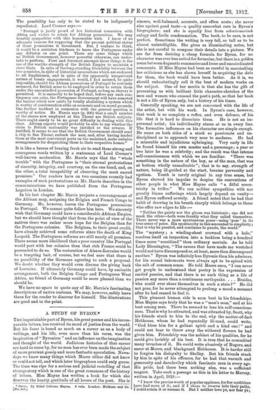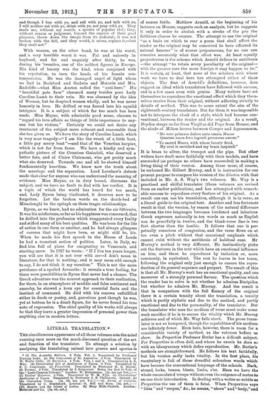A STUDY OF BYRON.*
THE imperishable part of Byron, his great poems and his incom- parable letters, has received its meed of justice from the world. But his fame is based as much on a career as on a body of writings, and his life, even more than his verse, was the inspiration of " Byronism " and an influence on the imagination and thought of the world. Judicious histories of that career are hard to come by, for no man has ever been made the subject of more prurient gossip and more fantastic speculation. Nowa- days we know many things which Moore either did not know or could not tell, and which later biographers could only guess. The time was ripe for a serious and judicial re-te]ling of that strange story which is one of the great romances of the history of letters. Miss Mayne has written a book for which she deserves the hearty gratitude of all lovers of the poet. She is
• Byron. By Ethel Colburn Mayne. 2 vela. London: Methuen and Co. (21s. net.]
sincere, well-balanced, accurate, and often acute; she never sins against good taste—a quality somewhat rare in Byron's
biographers; and she is equally free from achwdrmerisch eulogy and facile condemnation. The book, to be sure, is not perfect. Sometimes the writing is very tall, so tall as to be almost unintelligible. She gives us illuminating notes, but
she is not careful to compose their details into a picture. We are far from desiring a cheap formula for Byron, for no character was ever less suited for formulas; but there is a golden mean between dogmatic summaries and loose and uncoordinated comments. If Miss Mayne had been as careful in marshalling her criticisms as she has shown herself in acquiring the data
for them, the book would have been better. As it is, we
should unhesitatingly call it the best of modern works on the subject. One of her merits is that she has the gift of presenting us with brilliant little character-sketches of the men and women who crossed the poet's path, so that her book is not a life of Byron only, but a history of his times.
Generally speaking, we are not concerned with the life of the artist, but with his work. In Byron's case, however, that work is so complete a reflex, and even defence, of his life that it is hard to dissociate them. He is not an im- personal artist; his individuality stares at us in every line.
The formative influences on his character are simple enough. He came on both sides of a stock so passionate and un- disciplined as to approach very near to madness. He had a miserable and injudicious upbringing. Very early in life he found himself his own master and a personage; a year or two later he was a celebrity; and the result was that intense self-consciousness with which we are familiar. "There was something in the nature of the boy, as of the man, that was at bottom wholly unmalleable " ; that is to say, strength of nature, being ill-guided at the start, became perversity and egotism. Youth is rarely original in any true sense, but Byron showed his impulse to despise the conventions of other people in what Miss Mayne calls " a fitful eccen-
tricity in trifles." We can neither sympathize with nor greatly blame sufferings which largely depend on vanity—
and Byron suffered acutely. A friend noted that he had that habit of drawing in his breath sharply which belongs to those who offer raw edges to life
"Neither the gaiety nor the gloom was histrionic ; one did not mask the other—both were frankly what they called themselves. There never was a more spontaneous poser—using 'pose' in its true sense of poise. His spontaneity in this amounted to simplicity; that is why he puzzled, and continues to puzzle, the world."
The "mystery ; a winding-sheet crowned with a halo," resolves itself on inspection into a luckless being a hundred times more " sensitized " than ordinary mortals. As he told Lady Blessington, " The causes that have made me wretched would not have discomposed or, at least, more than discomposed another." Byron was infinitely less Byronic than his admirers, for his carnal bakemeats were always apt to be spiced with the salt of common sense. He told Moore once, "I can never get people to understand that poetry is the expression of excited passion, and that there is no such thing as a life of passion any more than a continuous earthquake. . . . Besides, who could ever shave themselves in such a state P" He did
not pose, for he never attempted to prolong a mood a moment after he had ceased to feel it.
This pleasant human side is seen best in his friendships. Miss Mayne says truly that he was a " man's man," and at his best among men. There he seemed to lose his self-conscious- ness. That is why he attracted, and was attracted by, Scott, why
his friends stuck to him to the end, why the matter-of-fact Hobhouse, whom he had repeatedly ill-used, could write, " God bless him for a gallant spirit and a kind one ! " and could not bear to throw away the withered flowers he had given him. Friendship was the noblest of his qualities, for he could give lavishly of his best. It is true that he committed many breaches of it. He could write abusively of Rogers, and sneer at Moore, and blackguard Hobhouse. It is harder still
to forgive his disloyalty to Shelley. But his friends stuck by him in spite of his offences, for he had that warmth and
generosity and daredevilry which fascinate men in every age. His pride, had there been nothing else, was a sufficient magnet. Take such a passage as this in his letter to Murray, written in April, 1819 :- " I know the precise worth of popular applause, for few scribbles have had more of it; and if I chose to swerve into their paths, I could retain it or resume it. But I neither love ye, nOr fear Ye ;
and though I buy with ye, and sell with ye, and talk with ye,
I will neither eat with ye, drink with ye, nor pray with ye. They made me, without my search, a species of popular idol ; they, without reason or judgment, beyond the caprice of their good pleasure, threw down the image from its pedestal ; it was not broken with the fall, and they would, it seems, replace it,—but they shall not."
With women, on the other hand, he was at his worst, and a very horrible worst it was. Fat and unlovely in
boyhood, and fat and ungainly after thirty, he was, during his 'twenties, one of the noblest figures in Europe.
His kind of beauty was the kind, when conjoined with his reputation, to turn the heads of his female con- temporaries. He was the damaged angel of light whom we find in Beckford and Godwin and Maturin. and Mrs. Radcliffe—what Miss Austen called the " anti-hero." His " beautiful pale face" charmed many besides poor Lady Caroline Lamb to their ruin. He was obsessed by the idea of Woman, but he despised women wholly, and he was never honestly in love. He drifted or was forced into his squalid intrigues. It is a subject of which far too much has been made. Miss Mayne, with admirable good sense, chooses to "regard his love affairs as things of little importance to any- one but his victims." Certainly we could not desire any treatment of the subject more reticent and reasonable than she has given us. We have the story of Caroline Lamb, which is very near tragedy—" I am like the wreck of a little boat, a little gay merry boat "—and that of the Venetian harpies, which is not far from farce. We have a kindly and sym- pathetic picture of the Countess Guiccioli, who deserved a better fate, and of Claire Clairmont, who got pretty much what she deserved. Towards one and all he showed himself fundamentally heartless. We know now the truth about
the marriage and the separation. Lord Lovelace's Astarte made that clear for anyone who can understand the meaning of
evidence. Miss Mayne, as in duty bound, discusses the subject, and we have no fault to find with her verdict. It is
a topic of which the world has heard far too much,
and, Lady Byron being vindicated, it deserves now to be forgotten. Let the broken words on the death-bed of Missolonghi be the epitaph on these tragic relationships.
Byron, as we know, had no admiration for the vie litteraire. It was his misfortune, so far as his happiness was concerned, that
he drifted into the profession which exaggerated every frailty and stifled many of his best qualities. He was born for the life of action in one form or another, and he had always glimpses of careers that might have been, or might still be, his.
When be made his first speech in the House of Lords be had a transient notion of politics. Later, in Italy, we find him full of plans for emigrating to Venezuela and starting anew. In 1817 he wrote " If I live ten years longer, you will see that it is not over with me—I don't mean in literature, for that is nothing ; and it may seem odd enough to say, I do not think it my vocation." This is not the mere petulance of a spoiled favourite : it reveals a true feeling, for there were possibilities in Byron that never had a chance. The Greek adventure was the nearest approach to their realization, for there, in an atmosphere of muddle and false sentiment and anarchy, he showed a keen eye for essential facts and the instinct of command. He died with his renown unfulfilled either in deeds or poetry, and, garrulous poet though he was, yet at bottom he is a dumb figure, for he never found his true note of expression. The chief quality of his works will always be that they leave a greater impression of personal power than anything else in modern letters.















































 Previous page
Previous page